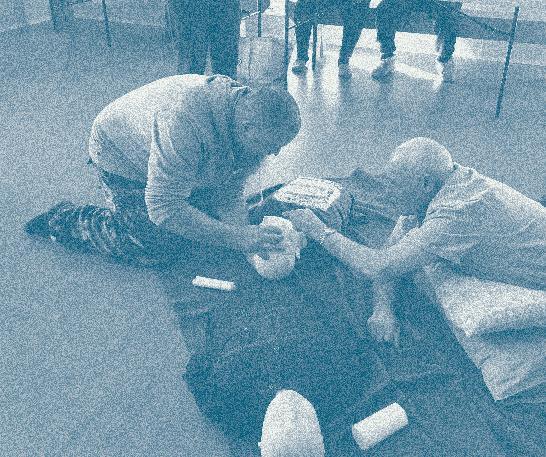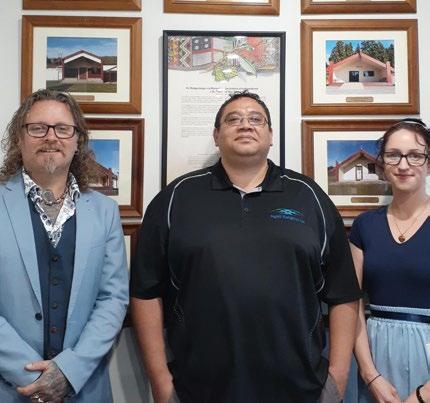
6 minute read
Māori Health Planning and our Iwi Partnerships
04
Māori Health Planning and our Iwi Partnerships
Whai Mana (equity), particularly for Māori, continues to be a focus of our mahi and is reflected strongly throughout our Health Strategy Te Toi Huarewa. The name of the strategy was gifted by Graham Bidois Cameron. Often when we are looking for an appropriate name for a specific purpose e.g. the Health Strategy, we will consider a pūrākau (Māori legend) that best reflects that purpose, our values and our vision.
TE TOI HUAREWA
Te Toi Huarewa – Puhi-whanake was one of the tōhunga (navigation experts) who travelled with Tamatea Ariki Nui (the captain) on the Takitimu waka to Aotearoa. During the voyage these men passed each night scanning the stars, in order to direct the steersmen and to be able to foretell weather conditions. They travelled all the way to the end of their journey, near the Waiau River in the South Island, and then stayed there as instructed by Tamatea Ariki Nui as ahi kaa (keeping the home fires burning, keeping a place warm through the presence of people) to serve as guardian of his wife who died there. Te Toi Huarewa o Puhi-whanake refers to a journey of striving to attain all knowledge and wellbeing under the guidance of a navigator who sees clearly in the darkness through all challenges. A toi huarewa is the whirlwind path to the highest heavens.
What is good for Māori is good for all, and what works for everyone does not necessarily work best for Māori.
In developing Te Toi Huarewa we chose not to have a separate Māori Health Plan, but rather a plan that focusses on Māori inequities, based on the analogy above.
We have started our journey in understanding what matters to whānau and meaningfully engaging with them to co-design primary healthcare services. Working initially with Health Care Home practices, we have delivered a consumer engagement and ‘co-design 101’ workshop and then each practice was provided with dedicated co-design expertise to work on a quality improvement project of their choice.
Whai Rangatiratanga is another key priority for us, which confirms our commitment that whānau, hapu and Iwi need to lead, determine and guide pathways that improve Māori health gain, and that we must continue to invest in Iwi-led and locally delivered kaupapa Māori services in partnership with General Practice.
The Long-Term Conditions Programme – Te Ahunga Whānau (meaning whānau-directed, whānau-centred and whānau-focussed) is an exciting pilot programme that has started with five General Practices (two in the Eastern Bay of Plenty and three in the Western Bay of Plenty) that will be led by Iwi and supported by General Practice. The model of care supporting the programme transcends across traditional health and social sector boundaries and incorporates clinical, social and environmental interventions and navigation support. It is a model of care that is patient/whānau-centred and will: •
Provide care that is respectful, responsive and meaningful to the individual patient preferences, needs and values and that ensures the patient and whānau goals inform clinical decisions.
Encourage high quality and sustainable long-term condition management within the community that empowers individuals and their whānau to take control of their wellness.
Be accessible, equitable and culturally appropriate.
Director of Māori Health, Kiri Peita (Ngāi Te Rangi and Ngāti Ranginui) has been actively engaging with practices across the network in various ways, including: •
An introductory session for General Practice teams on equity and why we focus on Māori health.
Guidance on implementation of Māori Health Plans developed by a practice’s Māori health working group.
Providing cultural support to a patient (kaumatua) in
General Practice following an Advanced Care Plan kōrerō with him.
Motiti Island resident
Richard West learns
CPR with first aid Students at Te Wharekura a Mauao learn the art of Mau Rakau.

MAU RAKAU Mau Rakau is delivered by Te Puna I Rangiriri Trust each school term to six local kura Māori and aims to train rangatahi Māori in the art of Mau Rakau through regular wananga. The traditional art form draws from a basis of training methods traditionally used by tupuna (ancestors). In a contemporary context the programme endorses discipline, culture and the importance of relationships and is underpinned by matauranga Māori (knowledge) and primarily delivered in te reo Māori. The programme is designed for tauira (students) who are at kura Māori. Wananga are held at different marae in the Mataatua region and rangatahi learn about the different marae they stay in and hear from the haukainga (local people of the marae) about the history of their whenua (land) and significant sites. The programme aims to achieve a future pathway that will continue the sustainable leadership growth of young people in Tauranga Moana.

KOIORA Koiora is a Ngāi Te Rangi leadership development programme that focusses on enhancement of hauora Māori for rangatahi. Koiora provides rangatahi with the following opportunities: •
Quality of life (rangatahi Māori health and wellbeing).
Economics and career pathing (rangatahi Māori are assisted in career choices and taught economic literacy).
Culture and identity (rangatahi Māori build on their cultural identity, increasing their knowledge of cultural heritage, ability to converse in te reo Māori and strengthen their understanding of tikanga).
Participation and equity (enable rangatahi Māori to build relationships, trust, respect – an expression of manaakitanga, whanaungatanga, pūmautanga, kaitiakitanga and rangatiratanga).
The Mataora Mental Health and Addiction Services

team, from left, Tony Burne (trauma counsellor), Roy
Nathan (addiction counsellor) and Kayla Coleman
(peer support).
MATAORA SERVICE Mataora is delivered by Ngāti Rānginui Iwi to increase access for whānau to culturally appropriate mental health and addiction services, encompassing trauma, addiction counselling and peer support advocacy. Since its establishment in July 2020, more than 100 whānau have engaged and accessed services ranging from complex trauma, mild to severe substance use disorders, coexisting disorders and mild to moderate emotional distress. Treatment ranges from individual, couple, and whānau therapy to implementation of a nineweek group self-care programme that fosters psychoeducation and alternative ways to wellness. The Koiora programme in action at Te Rereatukahia

Marae in Katikati.
Having a conversation with a GP regarding bilingual signage in the practice.
We have engaged with two of our island communities, Matakana and Motiti Islands. They shared with us what was on their wish list and we have ticked off some of their big-ticket items such as a first aid training course for Motiti Island residents and made significant progress in improving health service access via telehealth.
We have advocated at a ministerial level for one of our smaller communities, Ngā Whānau o Whareroa, calling for action regarding health and environmental issues caused by long-term daily exposure to environmental toxins.
During the COVID-19 pandemic the true meaning of mahi tahi (the unity of people working towards a specific goal or the implementation of a task) came to the fore. Iwi, kaupapa Māori providers, BOPDHB Māori Health Gains and Development (MHGD), community leaders and other health providers worked together to provide a kaupapa Māori Community Based Assessment Centre service called Pahi Tahi. The PHO Information Management team provided hardware and analytical support. Successes included re-engaging some patients who had not received a 2019 influenza vaccination.
Our Iwi-based programmes funded by the PHO demonstrated how flexible and how innovative Iwi were during the COVID-19 lockdown. There were changes to delivery methods across the services to ensure our whānau continued to be well-supported, including changing from wananga to online learning modules, using digital platforms to create content (e.g. Kahoot quizzes), utilisation of Facebook Messenger for virtual counselling and support, and motivational posts and resources shared on Facebook for whānau to access.









